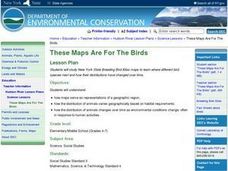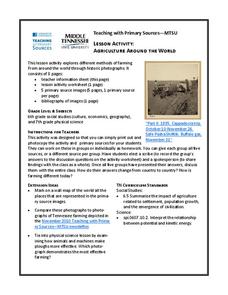Curated OER
Farm Babies
Students use flash cards to match the mother names to the baby names for farm animals. In a designated "barn" in the room, students simulate being mothers, fathers, and babies. The baby must find his mother and father. Students visit...
Curated OER
Back to the Farm
Students complete a family tree. In this farming and ranching lesson, students define the term genealogy, learn how to create a family tree, and fill in a family tree with the help of their parents making sure to note if any of their...
Global Oneness Project
The Consciousness of Nature
Scholars voice their opinions about animal consciousness with an article that challenges common ideas about nature. After reading the article, learners engage in a thoughtful discussion before writing out their arguments in a persuasive...
Curated OER
These Maps are for the Birds
Learners identify and study New York State Breeding Bird Atlas maps to learn where different bird species nest and how their distributions have changed over time. They also identify how maps serve as representations of a geographic...
Redefining Progress
Have and Have-Not
Is there a correlation between a country's wealth and the extent of its ecological footprint? What exactly constitutes an ecological footprint, and how does one country stack up against the rest? This is a unique lesson to incorporate...
Curated OER
Agriculture Around the World
Students explore various kinds of farming methods around the world. In this history lesson, students view pictures of farming methods, then compare and contrast them in a class discussion with the methods of farming that are used today.
Curated OER
Why Eat Organic?
Ninth graders explore the concept of organic eating. In this environmental stewardship lesson, 9th graders compare and contrast organic foods with conventional foods and discuss the benefits of eating organic foods.
Curated OER
Better Butter
Students explore the process of making butter. In this agriculture lesson, students discuss how butter is made today and how it was made in the past. Students make their own butter using baby food jars and some "elbow grease."
Curated OER
Music of the Estuary
Students explore the sounds of the estuary. In this wetlands lesson, students discuss how to simulate the sounds of nature. Students write and record a musical score featuring the sounds of the wetlands.
Curated OER
Era of Self-Sufficiency - Pre-1890
Students investigate the relationship between physical geography and Utah's settlement. In this Utah land lesson, students view a PowerPoint about Utah land and work in groups to answer questions about the uniqueness of Utah's Mormon...
Curated OER
Farming as a Way of Life
Sixth graders research the development of various agriculture techniques. Using this information, they determine how this led to the domestication of plants and animals and how other occupations were considered. They discuss the...
Curated OER
Do we Really Need Wild Nature
Students research challenges with which modern biotechnology confronts wild nature. Students collect articles that relate to biotechnology and the environment. Students prepare a collaborative answer to the question, "Do we really need...
Curated OER
Our Own City
Students will construct their own functioning city. Each day students will add to the city requiring adjustments and planning. They solve problems caused by increase in human settlement such as stacking houses creating apartments so that...
Curated OER
Hoosier Artists
Pupils examine the paintings of various Indiana artists. Using the internet, they relate the landscapes shown to the history of the state and how it affected Native Americans. Using the information they gathered, they write story...















